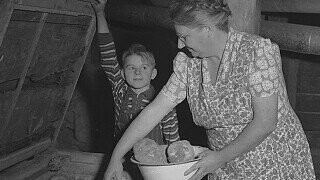During The Great Depression, Life Expectancy Actually Rose

During the Great Depression, everyone was poor and hungry, right? So you probably imagine that this was a time when a whole lot of Americans miserably died. And yet when we dig up the stats, it turns out people fared better health-wise during the Depression than right before or after that.
Life expectancy rose. Life expectancy, by the way, doesn’t actually describe how long you’ll live, since that depends on a bunch of factors from decades in the future, which no one can predict. We estimate life expectancy by looking at the ages of everyone who dies during some set period. During the Great Depression, people died older. Mortality dropped for men and women, for whites and non-whites, for middle-aged people, young adults, and infants.
In fact, looking at the 20-year period around the Depression, mortality dropped during every recession and peaked during every expansion. Life expectancy rose and fell in step with unemployment. One type of death—suicide—rose during recessions, predicably, but suicide isn’t anywhere common enough to outweigh all the other ways mortality went down.
Don't Miss
The researchers behind this Princeton study went into it without chasing any specific preconceived conclusion, and they don’t claim to know for certain just why people live longer during recessions. But they have a few ideas. People smoke and drink more when the economy’s good, contrary to what you might expect (though, the effects of that should take a long time to kick in). Work-related accidents drop when fewer people work, as do traffic accidents.
Fewer people have heart attacks during recessions, and that may be because they’re cut off from work stress. Sure, economic anxiety is stressful, but so is labor. Unemployment can also lead to more socialization, which has all kinds of health benefits. You might imagine that some people get their only human interaction at the office, but many jobs offer no socialization whatsoever, while staying at home with your family offers plenty.
Now that we lay it all out, the conclusion that “work is bad for you” might not sound that surprising after all.
This fact came from the One Cracked Fact newsletter. Want more like this, straight from your email inbox, without any ads or popups? Join here:
For more great Depression facts, check out:
Dance Marathons Could Last For Months During The Great Depression
6 Ways The Recession Has Made The World Suck Less
Hungary's 13,600,000,000,000,000 Percent Inflation
Follow Ryan Menezes on Twitter for more stuff no one should see.
